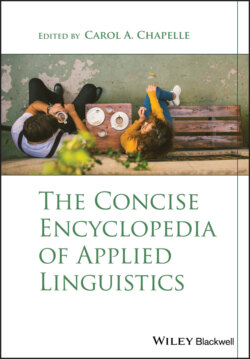Читать книгу The Concise Encyclopedia of Applied Linguistics - Carol A. Chapelle - Страница 26
Adverbs in Discourse
ОглавлениеAdverbs are more than mere ornamentation; they underpin processes of textual argumentation and provide additional, circumstantial information that helps avoid any sense of anomaly or incompleteness about what is being said (Goldberg & Ackerman, 2001, p. 798). Pervasive in discourse, adverbs occur across all genres, regardless of levels of formality or medium. And regardless of their many detractors, such as those cited at the outset. Used judiciously, their role may be crucial. Ernest Hemingway, known for his terse prose, was not totally immune to their use, especially the ‐ly variety: “after forty days without a fish the boy's parents had told him that the old man was now definitely and finally ‘salao’, which is the worst form of unlucky” (Hemingway, 1952, p. 1). Here, the meaning of “salao” (Cuban and southern Spanish slang for “the worst kind of bad luck”) is captured and reinforced by the two adverbs, as they herald the gloss in the relative clause that follows, and somehow hint at the inward travails the old man has yet to face.
Crystal (2004, pp. 279–81, 291–3) identifies very broad correspondences between text types and adverb use in historical, geographical, scientific, and instructional writing, and in courtroom language, sports commentary, and public speaking. For instance, historical writing is characterized by the use of temporal and space (place) adverbs (events have a time and a place); instructions by process adverbs (how and with what is “x” to be done). In their extensive quantitative analysis of adverbial behavior, Biber et al. (1999) explore four registers: conversation, fiction, news, and academic writing. Hasselgård (2010, pp. 7–10, 259–85) additionally covers sports commentary and social letters. Both conclude that, overall, adverbs (adjuncts) are more common in commentary and fiction. However, generalizations are not easy. As Crystal (2004, p. 279) remarks: “[Adverbial] choice and distribution will be influenced primarily by the subject‐matter of the discourse.” Indeed, their recruitment may be compelling:
So terrified was he . . . of being caught, by chance, in a false statement, that as a small boy he acquired the habit of adding “perhaps” to everything he said. “Is that you, Harry?” Mama might call from the drawing‐room. “Yes, Mama—perhaps.” “Are you going upstairs?” “Yes, perhaps.” “Will you see if I've left my bag in the bedroom?” “Yes, Mama, perhaps—p'r'haps—paps!” [italics added] (Toulmin, 2003, p. 41)
SEE ALSO: Formulaic Language and Collocation; Pragmatic Markers
